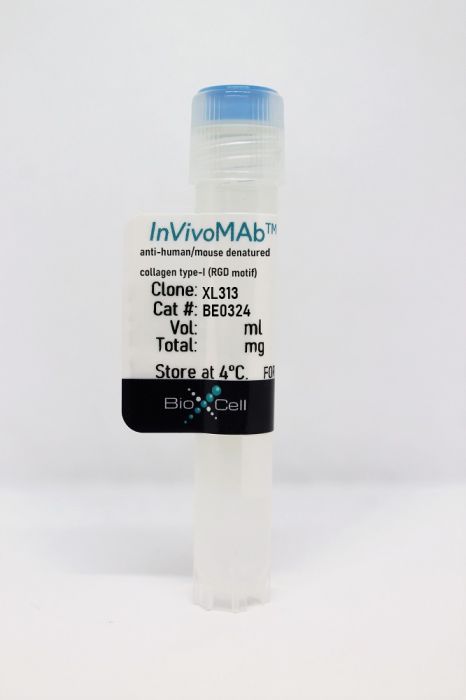InVivoMAb anti-human/mouse denatured collagen type-I (RGD motif)
Product Details
The XL313 monoclonal antibody reacts with denatured human and mouse collagen type-I but not native collagen type-I. The antibody reacts with the RGD motif. Collagen is a fibrous multi-chain triple helical protein that exists in numerous forms. Collagen type-I is the most abundant collagen type in the extracellular matrix. Collagen type-I, type-III, collagen type-IV and collagen type-V have been shown to be associated with all pre-existing blood vessels in vivo. Denaturation of the native three-dimensional structure of collagen is thought to expose cryptic regulatory regions that control angiogenesis. The XL313 antibody has been shown to inhibit angiogenesis in chick embryos and enhance the anti-tumor activity of anti-PD-L1 therapy in vivo. XL313 administration has also been shown to inhibit Lewis lung carcinoma tumor growth in C57BL/6 mice (shown in US Patent No: 7588760B2).Specifications
| Isotype | Mouse IgG1, κ |
|---|---|
| Conjugation | This product is unconjugated. Conjugation is available via our Antibody Conjugation Services. |
| Immunogen | Synthetic RGD containing human collagen peptides |
| Reported Applications |
Western blot Immunofluorescence in vivo administration (see description) |
| Formulation |
PBS, pH 7.0 Contains no stabilizers or preservatives |
| Endotoxin |
<2EU/mg (<0.002EU/μg) Determined by LAL gel clotting assay |
| Purity |
>95% Determined by SDS-PAGE |
| Sterility | 0.2 µm filtration |
| Production | Purified from cell culture supernatant in an animal-free facility |
| Purification | Protein G |
| RRID | AB_2819051 |
| Molecular Weight | 150 kDa |
| Storage | The antibody solution should be stored at the stock concentration at 4°C. Do not freeze. |
Western Blot, Immunofluorescence
Ames, J. J., et al. (2016). "Identification of an Endogenously Generated Cryptic Collagen Epitope (XL313) That May Selectively Regulate Angiogenesis by an Integrin Yes-associated Protein (YAP) Mechano-transduction Pathway" J Biol Chem 291(6): 2731-2750. PubMed
Extracellular matrix (ECM) remodeling regulates angiogenesis. However, the precise mechanisms by which structural changes in ECM proteins contribute to angiogenesis are not fully understood. Integrins are molecules with the ability to detect compositional and structural changes within the ECM and integrate this information into a network of signaling circuits that coordinate context-dependent cell behavior. The role of integrin alphavbeta3 in angiogenesis is complex, as evidence exists for both positive and negative functions. The precise downstream signaling events initiated by alphavbeta3 may depend on the molecular characteristics of its ligands. Here, we identified an RGD-containing cryptic collagen epitope that is generated in vivo. Surprisingly, rather than inhibiting alphavbeta3 signaling, this collagen epitope promoted alphavbeta3 activation and stimulated angiogenesis and inflammation. An antibody directed to this RGDKGE epitope but not other RGD collagen epitopes inhibited angiogenesis and inflammation in vivo. The selective ability of this RGD epitope to promote angiogenesis and inflammation depends in part on its flanking KGE motif. Interestingly, a subset of macrophages may represent a physiologically relevant source of this collagen epitope. Here, we define an endothelial cell mechano-signaling pathway in which a cryptic collagen epitope activates alphavbeta3 leading to an Src and p38 MAPK-dependent cascade that leads to nuclear accumulation of Yes-associated protein (YAP) and stimulation of endothelial cell growth. Collectively, our findings not only provide evidence for a novel mechano-signaling pathway, but also define a possible therapeutic strategy to control alphavbeta3 signaling by targeting a pro-angiogenic and inflammatory ligand of alphavbeta3 rather than the receptor itself.
- Cancer Research,
Targeting the secreted RGDKGE collagen fragment reduces PD‑L1 by a proteasome‑dependent mechanism and inhibits tumor growth.
In Oncology Reports on 1 February 2023 by Caron, J. M., Han, X., et al.
PubMed
Structural alterations of collagen impact signaling that helps control tumor progression and the responses to therapeutic intervention. Integrins represent a class of receptors that include members that mediate collagen signaling. However, a strategy of directly targeting integrins to control tumor growth has demonstrated limited activity in the clinical setting. New molecular understanding of integrins have revealed that these receptors can regulate both pro‑ and anti‑tumorigenic functions in a cell type‑dependent manner. Therefore, designing strategies that block pro‑tumorigenic signaling, without impeding anti‑tumorigenic functions, may lead to development of more effective therapies. In the present study, evidence was provided for a novel signaling cascade in which β3‑integrin‑mediated binding to a secreted RGDKGE‑containing collagen fragment stimulates an autocrine‑like signaling pathway that differentially governs the activity of both YAP and (protein kinase‑A) PKA, ultimately leading to alterations in the levels of immune checkpoint molecule PD‑L1 by a proteasome dependent mechanism. Selectively targeting this collagen fragment, reduced nuclear YAP levels, and enhanced PKA and proteasome activity, while also exhibiting significant antitumor activity in vivo. The present findings not only provided new mechanistic insight into a previously unknown autocrine‑like signaling pathway that may provide tumor cells with the ability to regulate PD‑L1, but our findings may also help in the development of more effective strategies to control pro‑tumorigenic β3‑integrin signaling without disrupting its tumor suppressive functions in other cellular compartments.

